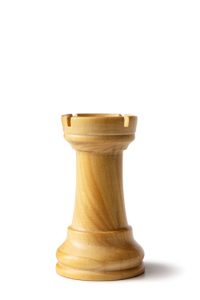Before answering this, let’s see a little context so you can understand better.
The name ‘rook’ comes from the Persian word ‘rukh’, meaning chariot. Centuries ago, the rook piece was designed to look like a chariot. Over time, its shape evolved into the castle-like form we know today.

The rook is also commonly called the castle. This is due to its fortified, tower-like appearance.
Regional Differences in The Names
In Russian, the rook is the ‘ladya’, while in German it goes by ‘Turm’, both of which translate to ‘tower’. The French call it ‘tour’, also meaning tower. Some Spanish speakers refer to it as ‘torre’ – you guessed it, tower again. Seeing a pattern here?
Meanwhile, in Arabic the rook is called ‘hatha’, in Chinese it’s ‘chu’, and in Hindi it’s known as ‘haathi’ which means elephant, likely due to its shape. See more of these names here.
So, Is it Rook or Castle?
The names ‘rook’ and ‘castle’ are used interchangeably in chess.
Historically, the rook piece was called the ‘castle’ because of its shape and its moves mimicking the defensive towers found in medieval castles. As chess spread around the world, the name evolved to ‘rook’ to avoid confusion in translations.
Today, most chess resources use ‘rook’ as the standard name for the piece. The World Chess Federation (FIDE) only uses ‘rook’ in official tournament rules and documentation.
Many chess players argue it’s time to standardize and call the piece by its most common and recognized name—the rook.
Calling the piece a ‘castle’ can be:
- Confusing for new players learning the game
- Problematic when translating chess resources and tutorials into other languages
- Inconsistent with most major chess organizations and tournaments
Some counter that ‘castle’ has historical significance and helps convey the defensive purpose of the piece.
However, its shape and movement in chess have evolved away from a literal castle, so ‘rook’ is a more apt name.
At the end of the day, whether you (personally) call it a rook, castle, or chariot, its movement and capturing power remain the same.
Want to know more about the rook?
Check out these articles:







join the conversation